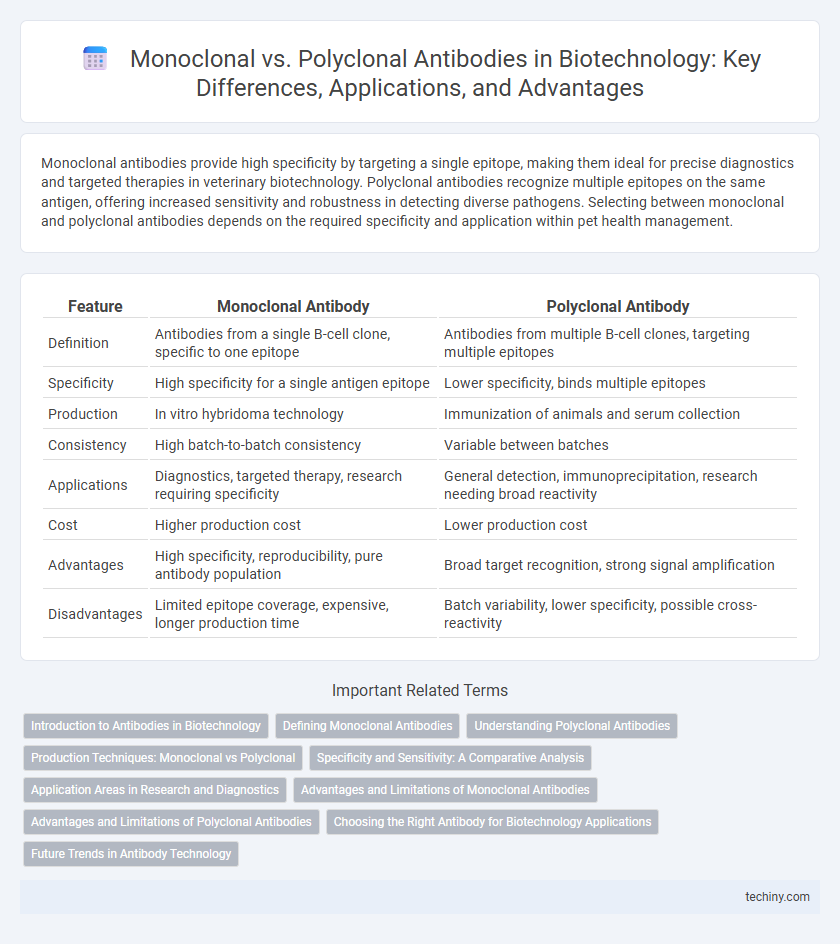Monoclonal antibodies provide high specificity by targeting a single epitope, making them ideal for precise diagnostics and targeted therapies in veterinary biotechnology. Polyclonal antibodies recognize multiple epitopes on the same antigen, offering increased sensitivity and robustness in detecting diverse pathogens. Selecting between monoclonal and polyclonal antibodies depends on the required specificity and application within pet health management.
Table of Comparison
| Feature | Monoclonal Antibody | Polyclonal Antibody |
|---|---|---|
| Definition | Antibodies from a single B-cell clone, specific to one epitope | Antibodies from multiple B-cell clones, targeting multiple epitopes |
| Specificity | High specificity for a single antigen epitope | Lower specificity, binds multiple epitopes |
| Production | In vitro hybridoma technology | Immunization of animals and serum collection |
| Consistency | High batch-to-batch consistency | Variable between batches |
| Applications | Diagnostics, targeted therapy, research requiring specificity | General detection, immunoprecipitation, research needing broad reactivity |
| Cost | Higher production cost | Lower production cost |
| Advantages | High specificity, reproducibility, pure antibody population | Broad target recognition, strong signal amplification |
| Disadvantages | Limited epitope coverage, expensive, longer production time | Batch variability, lower specificity, possible cross-reactivity |
Introduction to Antibodies in Biotechnology
Monoclonal antibodies are highly specific immunoglobulins produced by identical immune cells cloned from a single parent cell, offering uniformity ideal for targeted therapies and diagnostics. Polyclonal antibodies consist of a diverse mixture of immunoglobulins secreted by multiple B cell clones, providing broad-spectrum binding useful in detecting multiple epitopes of a target antigen. Both types play crucial roles in biotechnology applications such as immunoassays, therapeutic development, and molecular research due to their distinct specificity and affinity profiles.
Defining Monoclonal Antibodies
Monoclonal antibodies are highly specific antibodies produced by identical immune cells, cloned from a single parent B-cell, targeting a single epitope on an antigen. They are essential in biotechnology for diagnostics, therapeutics, and research due to their uniform affinity and reduced batch variability. This contrasts with polyclonal antibodies, which consist of mixed populations targeting multiple epitopes, resulting in greater heterogeneity.
Understanding Polyclonal Antibodies
Polyclonal antibodies are a heterogeneous mixture of immunoglobulins produced by different B cell clones in response to an antigen, providing broad epitope recognition and enhanced sensitivity in assays. These antibodies are typically generated by immunizing animals such as rabbits or goats, resulting in a diverse antibody population that binds multiple epitopes on the same antigen. Their ability to detect proteins with variable conformations makes polyclonal antibodies valuable in applications including Western blotting, ELISA, and immunohistochemistry.
Production Techniques: Monoclonal vs Polyclonal
Monoclonal antibodies are produced using hybridoma technology, where a single B-cell is fused with a myeloma cell to generate identical antibody-producing clones, ensuring specificity to a single epitope. Polyclonal antibodies are generated by immunizing animals, such as rabbits or goats, leading to a heterogeneous mixture of antibodies targeting multiple epitopes on the same antigen. The hybridoma method offers consistent batch-to-batch uniformity, while polyclonal production provides broad antigen recognition but with variability across batches.
Specificity and Sensitivity: A Comparative Analysis
Monoclonal antibodies exhibit high specificity, binding to a single epitope on an antigen, which minimizes cross-reactivity and improves precision in diagnostic and therapeutic applications. Polyclonal antibodies, recognizing multiple epitopes on the same antigen, offer greater sensitivity and enhanced signal detection due to their diverse binding capabilities. The choice between monoclonal and polyclonal antibodies depends on the balance required between specificity for targeted identification and sensitivity for detecting low-abundance proteins in biotechnological assays.
Application Areas in Research and Diagnostics
Monoclonal antibodies provide high specificity in research and diagnostic applications, enabling precise targeting of specific antigens in cancer detection, infectious disease assays, and autoimmune disorder identification. Polyclonal antibodies, with their ability to recognize multiple epitopes, are widely used in immunoprecipitation, Western blotting, and ELISA for enhanced signal detection and broad antigen recognition. Both antibody types play critical roles in biosensor development and therapeutic monitoring, complementing each other in sensitivity and specificity across various biotechnological platforms.
Advantages and Limitations of Monoclonal Antibodies
Monoclonal antibodies offer high specificity and uniformity by targeting a single epitope, making them ideal for diagnostic and therapeutic applications in biotechnology. Their limitations include higher production costs and sensitivity to epitope changes, which can reduce efficacy against antigen variants. Despite these challenges, the reproducibility and targeted action of monoclonal antibodies provide significant advantages over polyclonal antibodies in precision medicine.
Advantages and Limitations of Polyclonal Antibodies
Polyclonal antibodies offer the advantage of recognizing multiple epitopes on a single antigen, enhancing sensitivity and providing robust detection in complex samples. They are cost-effective and rapidly produced, making them suitable for preliminary research and diagnostic applications. Limitations include batch-to-batch variability and lower specificity compared to monoclonal antibodies, which can lead to higher background noise and cross-reactivity in assays.
Choosing the Right Antibody for Biotechnology Applications
Monoclonal antibodies offer high specificity by targeting a single epitope, making them ideal for diagnostic assays and therapeutic applications that require consistent performance. Polyclonal antibodies recognize multiple epitopes on an antigen, providing stronger signal amplification and better detection in complex sample matrices, suitable for immunoprecipitation and Western blotting. Selecting the appropriate antibody depends on factors such as target specificity, experimental reproducibility, and sensitivity requirements in biotechnology workflows.
Future Trends in Antibody Technology
Monoclonal antibodies are increasingly favored in therapeutic applications due to their specificity and reproducibility, while polyclonal antibodies remain valuable for detecting multiple epitopes in complex samples. Advances in recombinant antibody engineering and phage display technologies are driving the development of next-generation antibodies with enhanced affinity, stability, and reduced immunogenicity. Emerging trends also include bispecific antibodies and antibody-drug conjugates, which combine targeting precision with therapeutic payload delivery, expanding the scope of personalized medicine in biotechnology.
Monoclonal Antibody vs Polyclonal Antibody Infographic

 techiny.com
techiny.com